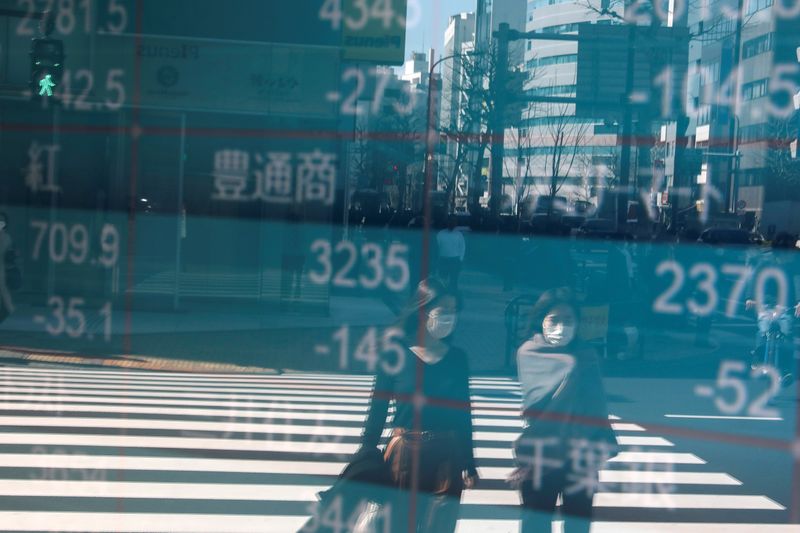
FILE PHOTO: People wearing protective face masks, following an outbreak of the coronavirus, are reflected on a screen showing Nikkei index, outside a brokerage in Tokyo, Japan February 28, 2020. REUTERS/Athit Perawongmetha
October 13, 2020
By Scott Murdoch and Suzanne Barlyn
HONG KONG/NEW YORK (Reuters) – Asian shares slipped on Tuesday, brushing off a firmer Wall Street lead as China’s post-holiday rally cooled, although a buoyant tech sector and fresh optimism about U.S. stimulus are expected to continue to support sentiment.
MSCI’s broadest index of Asia-Pacific shares outside Japan <.MIAPJ0000PUS> dipped into negative territory in the Asian session, down 0.09%.
Weakness emerged early in China as the Shanghai Composite <.SSEC> slipped 0.5%, trimming gains made in the two trading days since a week-long public holiday last week. China’s blue chip index CSI300 <.CSI300> shed 0.3%.
The morning session of Hong Kong’s Hang Seng index <.HSI> was canceled as the city faced a typhoon warning.
In Japan, the Nikkei index <.N225> was off 0.2%.
Despite the volatility across the region on Tuesday, Surich Asset Management founder Simon Yuen said he was confident Asian stock markets would retain positive fundamentals following the U.S election on Nov 3.
“We expect Asian equities should outperform the global equity market in next two to three years because if (Joe) Biden is elected U.S. shall have an easier relationship with China,” Yuen said.
“On the other hand, if (Donald) Trump is elected, China will promote demand in terms of consumer spending in order to increase their dominance over the world.”
Australian S&P/ASX 200 <.ASXJO> was the region’s only bright spot, up 1% on firmer bank stocks and despite a selldown in major coal names after reports China could look to ban Australian imports of the commodity.[.AX]
On Wall Street, the Nasdaq Composite <.IXIC> on Monday staged its biggest one-day rally in a month, jumping 2.56%. The Dow Jones Industrial Average <.DJI> rose 0.88% and the S&P 500 <.SPX> gained 1.64%.
The U.S. dollar was pinned near a three-week low and gold, another safe-haven asset, stayed below a three-week high, slapped by investor demand for risk.
The dollar index <=USD> gained 0.15%, reversing an earlier fall in the U.S. session.
Wall Street gains on Monday were driven by Apple Inc <AAPL.O>, which surged 6.4% ahead of an expected debut of its latest iPhone on Tuesday, while Amazon <AMZN.O> rallied 4.8% ahead of its Prime Day shopping event this week.
Investors now await U.S. bank results with JPMorgan <JPM.N> and Citigroup <C.N> kicking off third-quarter earnings season on Tuesday. Goldman Sachs <GS.N>, Bank of America <BAC.N> and Wells Fargo <WFC.N> and Morgan Stanley <MS.N> report later in the week.
Bets that more U.S. stimulus was in the offing came despite signs that talks in Washington had stalled again, leading the Trump administration to call on Congress to pass a less ambitious coronavirus relief bill.
U.S. Senate Republicans said they will go along with what President Trump wants in coronavirus relief legislation, a White House spokeswoman said on Monday.
Beijing’s tensions with Washington are also in view after the White House moved forward with three sales of advanced weaponry to Taiwan, sources familiar with the situation said on Monday.
The move in the run-up to the U.S. election is likely to anger China, which considers Taiwan a renegade province.
Investors are also closely watching the global resurgence in coronavirus cases after British Prime Minister Boris Johnson on Monday announced a new system of restrictions on parts of England. Lawmakers will vote on the move on Tuesday.
Gold <XAU=> was 0.35% weaker to $1,915.36 an ounce.
In energy markets, oil prices slipped after a force majeure at Libya’s largest oilfield lifted, a Norwegian strike affecting production ended and U.S. producers began restoring output after Hurricane Delta.
In Asian trade, Brent crude <LCOc1> was 0.05% higher at $41.71 a barrel. U.S. West Texas Intermediate <CLc1> climbed by the same amount to reach $39.41.
(Reporting by Scott Murdoch and Suzanne Barlyn; Editing by Sam Holmes)
